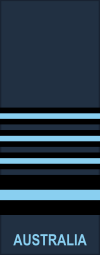Air Chief Marshal (Australia)
| Air marshal |
|
|---|---|

An Australian air chief marshal's rank insignia
|
|

An air chief marshal's officer distinguishing flag
|
|
| Country | Australia |
| Service branch |
|
| Abbreviation | ACM |
| Rank | Air Chief Marshal |
| NATO rank | OF-9 |
| Non-NATO rank | O-10 |
| Formation | 1965 |
| Next higher rank | Marshal of the RAAF |
| Next lower rank | Air marshal |
| Equivalent ranks | |
Air chief marshal (abbreviated as ACM) is the highest active rank of the Royal Australian Air Force and was created as a direct equivalent of the British Royal Air Force rank of air chief marshal. It is also considered a four-star rank. The only time the rank is held is when the Chief of the Defence Force is an Air Force officer.
Air chief marshal is a higher rank than air marshal and is a lower rank than Marshal of the Royal Australian Air Force, which has only ever been awarded as an honorary rank. Air chief marshal is a direct equivalent of admiral in the Royal Australian Navy and general in the Australian Army.
The insignia worn on the uniform is three light blue bands (each on a slightly wider black band) over a light blue band on a black broad band.
Australian air chief marshals may also fly an officer distinguishing flag. For air chief marshals this comprises five horizontal stripes which from top to bottom are coloured: dark blue, light blue, red (double thickness), light blue and dark blue with four stars imposed in a line on the red stripe.
With the establishment of the Australian Air Board on 9 November 1920, Australian Air Corps officers dropped their army ranks in favour of those based on the Royal Air Force. However, it was not until 1965 when Sir Frederick Scherger became Chairman of the Chiefs of Staff Committee and was promoted to air chief marshal that an RAAF officer attained the rank. Throughout the history of the RAAF, only four of its officers have held the rank. Apart from Scherger, they are Sir Neville McNamara (in 1982), Sir Angus Houston (in 2005) and Mark Binskin (in 2014).
...
Wikipedia
